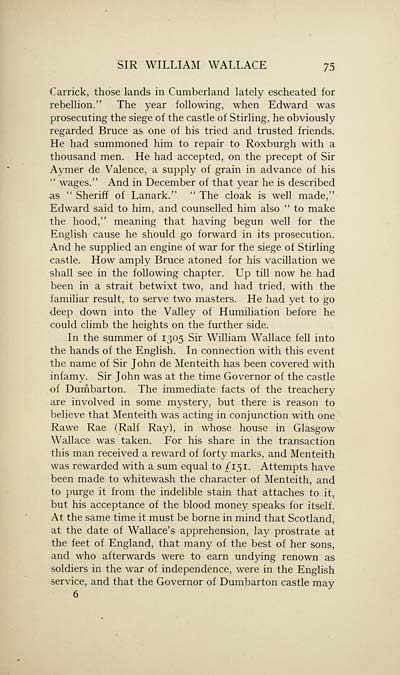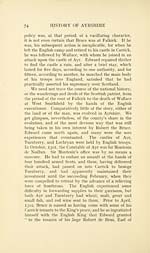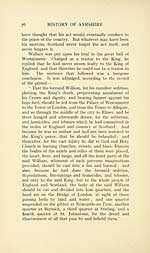Download files
Complete book:
Individual page:
Thumbnail gallery: Grid view | List view

SIR WILLIAM WALLACE 75
Carrick, those lands in Cumberland lately escheated for
rebellion." The year following, when Edward was
prosecuting the siege of the castle of Stirling, he obviously
regarded Bruce as one of his tried and trusted friends.
He had summoned him to repair to Roxburgh with a
thousand men. He had accepted, on the precept of Sir
Aymer de Valence, a supply of grain in advance of his
" wages." And in December of that year he is described
as " Sheriff of Lanark." " The cloak is well made,"
Edward said to him, and counselled him also " to make
the hood," meaning that having begun well for the
English cause he should go forward in its prosecution.
And he supplied an engine of war for the siege of Stirling
castle. How amply Bruce atoned for his vacillation we
shall see in the following chapter. Up till now he had
been in a strait betwixt two, and had tried, with the
familiar result, to serve two masters. He had yet to go
deep down into the Valley of Humiliation before he
could climb the heights on the further side.
In the summer of 1305 Sir William Wallace fell into
the hands of the English. In connection with this event
the name of Sir John de Menteith has been covered with
infamy. Sir John was at the time Governor of the castle
of Dumbarton. The immediate facts of the treachery
are involved in some mystery, but there is reason to
believe that Menteith was acting in conjunction with one
Rawe Rae (Ralf Ray), in whose house in Glasgow
Wallace was taken. For his share in the transaction
this man received a reward of forty marks, and Menteith
was rewarded with a sum equal to £151. Attempts have
been made to whitewash the character of Menteith, and
to purge it from the indelible stain that attaches to it,
but his acceptance of the blood money speaks for itself.
At the same time it must be borne in mind that Scotland,
at the date of Wallace's apprehension, lay prostrate at
the feet of England, that many of the best of her sons,
and who afterwards were to earn undying renown as
soldiers in the war of independence, were in the English
service, and that the Governor of Dumbarton castle may
6
Carrick, those lands in Cumberland lately escheated for
rebellion." The year following, when Edward was
prosecuting the siege of the castle of Stirling, he obviously
regarded Bruce as one of his tried and trusted friends.
He had summoned him to repair to Roxburgh with a
thousand men. He had accepted, on the precept of Sir
Aymer de Valence, a supply of grain in advance of his
" wages." And in December of that year he is described
as " Sheriff of Lanark." " The cloak is well made,"
Edward said to him, and counselled him also " to make
the hood," meaning that having begun well for the
English cause he should go forward in its prosecution.
And he supplied an engine of war for the siege of Stirling
castle. How amply Bruce atoned for his vacillation we
shall see in the following chapter. Up till now he had
been in a strait betwixt two, and had tried, with the
familiar result, to serve two masters. He had yet to go
deep down into the Valley of Humiliation before he
could climb the heights on the further side.
In the summer of 1305 Sir William Wallace fell into
the hands of the English. In connection with this event
the name of Sir John de Menteith has been covered with
infamy. Sir John was at the time Governor of the castle
of Dumbarton. The immediate facts of the treachery
are involved in some mystery, but there is reason to
believe that Menteith was acting in conjunction with one
Rawe Rae (Ralf Ray), in whose house in Glasgow
Wallace was taken. For his share in the transaction
this man received a reward of forty marks, and Menteith
was rewarded with a sum equal to £151. Attempts have
been made to whitewash the character of Menteith, and
to purge it from the indelible stain that attaches to it,
but his acceptance of the blood money speaks for itself.
At the same time it must be borne in mind that Scotland,
at the date of Wallace's apprehension, lay prostrate at
the feet of England, that many of the best of her sons,
and who afterwards were to earn undying renown as
soldiers in the war of independence, were in the English
service, and that the Governor of Dumbarton castle may
6
Set display mode to:
![]() Universal Viewer |
Universal Viewer | ![]() Mirador |
Large image | Transcription
Mirador |
Large image | Transcription
Images and transcriptions on this page, including medium image downloads, may be used under the Creative Commons Attribution 4.0 International Licence unless otherwise stated. ![]()
| Histories of Scottish families > Ayrshire > Volume 1 > (85) Page 75 |
|---|
| Permanent URL | https://digital.nls.uk/95195306 |
|---|
| Attribution and copyright: |
|
|---|
| Description | A selection of almost 400 printed items relating to the history of Scottish families, mostly dating from the 19th and early 20th centuries. Includes memoirs, genealogies and clan histories, with a few produced by emigrant families. The earliest family history goes back to AD 916. |
|---|

